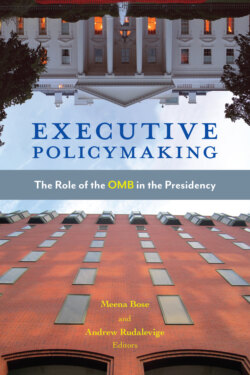Читать книгу Executive Policymaking - Andrew Rudalevige - Страница 5
На сайте Литреса книга снята с продажи.
ОглавлениеForeword
The Office of Management and Budget (OMB) is a remarkable institution at the heart of executive branch policymaking. Whether developing the president’s budget submission, advocating for administration priorities in budget negotiations, reviewing and analyzing proposed bills and regulations, or overseeing management processes, OMB is integral to the governing of our nation. OMB’s cross-cutting responsibilities allow it to exercise outsize influence on the policymaking process, and it plays a key role in budgetary and regulatory decisions stretching across every function of government and sector of the economy, from entitlements and defense programs to education grants, nuclear safety, and automobile emissions.
For all of OMB’s influence in shaping and executing policy priorities, it remains an intimate and low-profile institution, especially compared to other, larger Cabinet-level agencies. OMB’s workforce is bound together by duty, pride in service, and deep and apolitical expertise. For decades, OMB’s ethos of meticulous competence has safeguarded its government-wide reputation for insight and analysis and protected its seat at the table in vital national discussions.
I spent over seven years at OMB, including nearly four years as director under two presidents. In that time, and by engaging with OMB in subsequent roles, I developed a deep respect for the committed civil servants who carry out its mission across administrations, and I take pride in the years I participated in OMB’s shaping and executing national priorities. Heavy workloads and tight schedules, coupled with the scope and importance of OMB’s work, made for an intense experience, but I treasure my time there as some of the most rewarding years I spent in government. Further, I am grateful I had the opportunity to explore the full breadth of government programs and economic activity throughout our nation, with the support of an incredibly talented team. I often relied on what I learned at OMB in subsequent roles as White House Chief of Staff, Secretary of the Treasury, and Deputy Secretary of State.
OMB is rightly celebrated for the work it does by directing its considerable analytic capacity outward, but this volume represents a chance to reverse that perspective and turn the analytical lens inward. I hope the lessons contained in this volume will inform the next generation of civil servants and policy officials as they improve and continue OMB’s essential mission.
—The Honorable Jacob J. Lew
